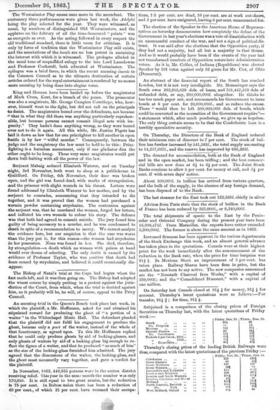Serjeant Mahaig seduced Elizabeth Waterer, and on Tuesday might, 3rd
November, both went to sleep at a publichouse in Cruildford. On Friday, 6th November, their door was broken open, and the girl was found dead, with marks of strangulation, and the prisoner with alight wounds in his throat. Letters were found arldressed by Elizabeth Waterer to her mother, and by the .serjeant to comrades, announcing that they intended to die together, and it was proved that the woman had purchased a vermin powder containing strychnine. The contention against the serjeant was, that he murdered the woman, forged her letters, and inflicted his own wounds to colour his story. The defence was that both had agreed to commit suicide. The jury found him guilty of being accessory to a murder, and he was condemned to death in spite of a recommendation to mercy. We cannot analyze the evidence here, but our suspicion is that the ease was worse than the jury put it, for this reason—the woman had strychnine in her possession. None was found in her. She died, therefore, by strangulation—a death which no woman with poison at hand would ever dream of selecting. The only doubt is caused by the evidence of Professor Taylor, who was positive that death had been caused by strychnine, and believed it could occasionally dis- .appear.






























 Previous page
Previous page